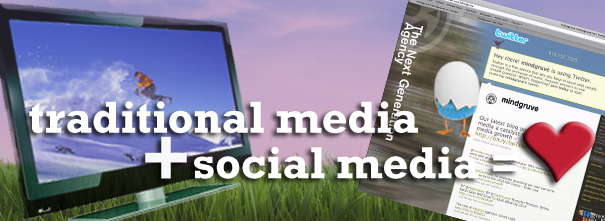
For years, television has seen a steady ratings decline for prime time slots and major event broadcasts. Naturally, the consistent surge of websites (especially social ones) has been blamed, but the 2010 Vancouver Winter Olympics may be proving that trend incorrect. Earlier this year, televised events coupled with online campaigns and social media engagement, such as the #SB44 tweet grid and socially-influenced Grammy site, WereAllFans.com, saw a ratings spike when compared to the previous year, revealing a shift in media user behavior. This shift leads us to believe that 2010 will be the year that we finally see social and traditional media working in unison to carry the experience from one medium to the next and improve engagement/ratings.
Though we were less than thrilled with NBC’s West Coast time delay, the network took strong steps to create a cohesive online marketing campaign that pushed us to tune-in for the final results – whether or not we already knew them.
Considered “the first social media Olympics” by Alex Huot, head of social media for the International Olympic Committee, NBC kept pace with the development of features, including the “Athlete Twitter Sheet,” which allowed users to search for tweets by athlete or sport and “Twitter Tracker,” which gives sports fans the ability to see popular news. Additionally, NBC’s robust website housed tabs ranging from “Tweets & Blogs” to “My Hometown Coverage” to “Videos,” all of which had more features to browse through, such as Digg Olympic tags and event replays.
Businesses often ask, “If we’re doing A, do we really need to do B and C?” NBC’s accomplishments prove that the answer is yes. Vancouver’s opening ceremonies alone pulled nearly 33 million viewers, while the remainder of the 17-day event garnered high ratings, according to the Associated Press. The same can be said for other major televised events, including the 2010 Grammy’s and Super Bowl 44, which both received noteworthy ratings through some engaging marketing tactics.
According to Wayne Friedman, “fifty-five percent of users who visited NBCOlympics.com have been watching TV and the Web site at the same time.” This is also true for mobile NBC users. In this case, Olympic sponsors, such as Coca-Cola, used a virtual snowball fight and iPhone app with NBC to benefit as well as receive high scores in brand recall, media recall and brand likability.
Search engines like Yahoo, which drew 32 million visitors and 314 million minutes time spent online, also delivered interactive features (that we believe likely contributed to NBC’s ratings as well) and gave fans the opportunity to take part in the Olympic fun.
With the amount of new technology, tools and creativity available, the audience experience is changing to seamlessly carry through from one medium to the next in order to truly capture their attention. Let’s face it, the Olympic numbers show that engaging, multi-platform content is here to stay and we hope brands won’t shy away from it, but embrace it for what it really is – awesome!